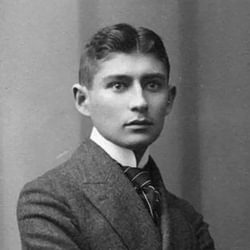A Dream
Josef K. dreamed:
It was a beautiful day and K. wanted to go for a walk. But no sooner had he taken two steps than he was in the cemetery. There were very artificial, impractically tortuous paths there, but he glided along such a path as if on raging water in an imperturbably floating posture. Even from a distance he caught sight of a freshly raised burial mound, at which he wanted to stop. This burial mound almost tempted him and he believed he was in no hurry to get there. Sometimes, however, he hardly saw the burial mound, it was hidden from him by flags, the cloths of which twisted and beat against each other with great force; you couldn't see the standard-bearers, but it was as if there was a lot of jubilation there.
While he was still looking into the distance, he suddenly saw the same burial mound next to him on the path, almost behind him. He hurriedly jumped into the grass. As the path raced on under his jumping foot, he staggered and fell on his knee just in front of the burial mound. Two men stood behind the grave, holding a tombstone in the air between them; No sooner had K. appeared than they pushed the stone into the ground and it stood as if it were solidly walled. Immediately a third man stepped out of the bushes, whom K. immediately recognized as an artist. He was only dressed in trousers and a badly buttoned shirt; he had a velvet cap on his head; in his hand he was holding an ordinary pencil with which he was already drawing figures in the air as he approached.
With this pencil he started on top of the stone; the stone was very high, he didn't have to bend down at all, but he did have to lean forward because the burial mound, which he did not want to step on, separated him from the stone. So he stood on tiptoe and leaned his left hand on the surface of the stone. With a particularly skillful handling he succeeded in making gold letters with the ordinary pencil; he wrote: "Here rests -" Every letter appeared clean and beautiful, deeply carved and perfectGold. When he had written the two words, he looked back at K.; K., who was very eager to see the progression of the inscription, hardly bothered about the man, but only looked at the stone. The man actually started to write again, but he couldn't, there was some obstacle, he lowered the pencil and turned back to look at K.. Now K. looked at the artist too and noticed that he was in great embarrassment, but that it was the cause of itcouldn't say. All of its earlier vivacity was gone. This embarrassed K. too; they exchanged helpless looks; there was an ugly misunderstanding that no one could resolve. At the wrong time, a small bell from the burial chapel began to ring, but the artist waved his hand up and it stopped. After a while it started again; this time very quietly and, without any special request, immediately breaking off; it was,as if she just wanted to test her sound. K. was inconsolable about the artist's situation, he began to cry and sobbed for a long time in the hands he held up to him. The artist waited until K. had calmed down and then, since he could not find any other way out, decided to continue writing. The first small line he made was a relief for K., but the artist evidently only brought it about with the greatest reluctance; the writing wasn't like that anymore eitherbeautiful, above all there seemed to be a lack of gold, the line dragged on pale and uncertain, only the letter became very large. It was a J, it was almost over, when the artist stomped angrily with one foot into the burial mound, so that the earth flew up all around. K finally understood him; There was no more time to ask him; With all his fingers he dug into the earth, which offered almost no resistance; everything seemed prepared; a thin crust of the earth had only appeared to have been erected; right behind her a large hole with sloping walls opened into which K. sank onto his back by a gentle current. But while he was being taken in by the impenetrable depth below, his head still erect at the neck, his name chased across the stone with mighty ornaments above.
He woke up delighted at the sight.
Literary icon whose "Kafkaesque" works, like "The Metamorphosis," probe alienation and existential absurdity.
